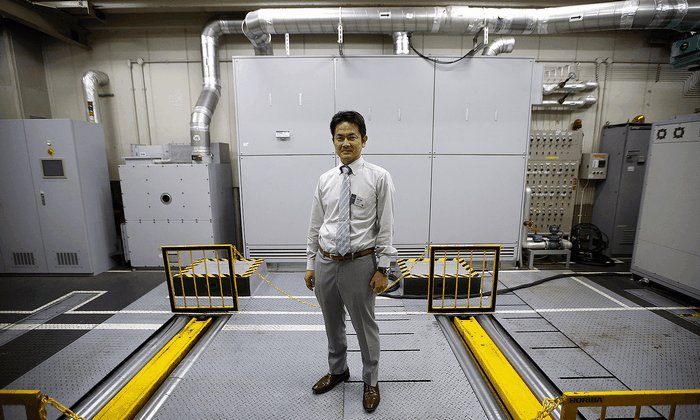The Japanese Emissions Equipment Maker that Humbled VW

Nakamura wasn't sure, but he had a hunch that his employer, Horiba Ltd., an obscure Japanese manufacturer that makes about 70 percent of the world's auto emissions testing systems, had played a key role in uncovering a scandal involving one of the giants of the industry.
Volkswagen, whose stock has lost more than one-third of its value since the news broke Sept. 18, out-employs Horiba by almost 100-to-1.
Turned out Nakamura, the 42-year-old chief manager of automotive strategy at Horiba, was spot on.
U.S. researchers had relied on Horiba's portable emissions measuring systems in a multi-year round of testing that ended up catching Volkswagen in a lie about engines it had billed as "clean" diesels.
Horiba's equipment helped tip off the researchers to a scheme in which 11 million Volkswagen Group cars around the world pollute more on the road than in lab tests, exceeding U.S. limits by as much as 40 times more than the law allows.
"This reminded us of our sense of responsibility," Nakamura said in an interview this week at Horiba's headquarters in Kyoto, Japan. "It's regrettable that our portable equipment helped find the cheating but failed to work as a deterrent."
Portable analyzer
Horiba was started in 1945 with the goal of continuing nuclear physics research that had been disrupted by World War II. It later diversified and completed its first emissions analyzer during Japan's 1960s postwar economic boom.
Its entry into the market was in response to growing unease about air pollution, a byproduct of the nation's growing industrial might.
Nakamura joined Horiba in 1998 and began developing its first portable, on-board emissions analyzer, the OBS-1000. The first-generation model was a commercial failure, he said. Horiba promoted him anyway, later sending him to the U.S. to learn about its market from 2006 to 2008.
A half decade after Nakamura's stint in the U.S. ended, the nonprofit International Council on Clean Transportation sought to show that diesel emissions in the U.S. under actual driving conditions were lower than in Europe.
Instead, disparities between real-world emissions and lab performance prompted an investigation by the California Air Resources Board that eventually exposed Volkswagen.
The ICCT hired the Center for Alternative Fuels, Engines and Emissions at West Virginia University, to test diesel vehicles in the U.S. in 2013. The center evaluated three diesel passenger cars, including a Volkswagen Passat and Jetta, using Horiba's portable measuring equipment with hoses attached to vehicles' exhaust pipes.
On-road tests
Horiba equipment revealed that while the Volkswagen cars met U.S. Clean Air Act standards in the lab, they emitted oxides of nitrogen at higher levels than allowed on the road.
The California board's technical staff spent months meeting with Volkswagen engineers trying to get to the bottom of the discrepancies. The German automaker initially said the researchers must have run the tests wrong and in part blamed Horiba's equipment, suggesting the instruments they were using may not have been calibrated correctly.
Volkswagen eventually admitted it had installed sophisticated software into the engine-control module of cars from 2009 to 2015 that senses when the vehicles are being tested or not, based on indicators such as movement in the steering wheel.
The scandal has led to the resignation of former Volkswagen CEO Martin Winterkorn and the loss of about $31 billion (28 billion euros) in market value for the German carmaker. By comparison, Horiba has a market cap of about 185 billion yen ($1.5 billion).
"It is crucial that something like this never happens again," Matthias Mueller, Volkswagen's new CEO, said at a press conference after succeeding Winterkorn last week.
Small systems
Horiba's portable emissions systems include OBS-ONE, which it began selling last year starting at about 20 million yen.
The smallest version of the boxy device weighs about 32 kilograms (71 pounds) and can fit in the trunk of a sedan or floor of a hatchback.
Bigger emissions-measuring systems used in labs begin at about 100 million yen and can cost as much as 800 million yen.
The company counts all Japanese carmakers as customers and also sells equipment to U.S. and European automakers, and suppliers and regulators worldwide.
Competitors include AVL List GmbH in Austria, which does far more business with Volkswagen, Nakamura said.
It's too early to tell whether Horiba will get more orders as regulators around the globe step up scrutiny of emissions testing, he said.
"Horiba will probably benefit greatly as regulations worldwide will be tightened after the Volkswagen scandal," said Takeshi Miyao, an analyst at researcher Carnorama in Tokyo. "The expansion in demand for emissions analyzers, especially portable ones, will be significant. Horiba has already built a dominant status in this industry."
Related News


